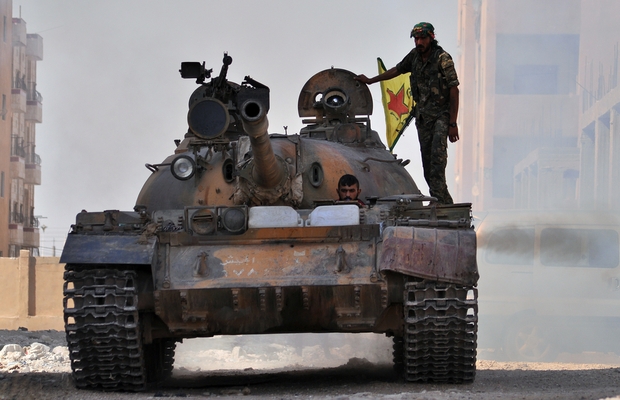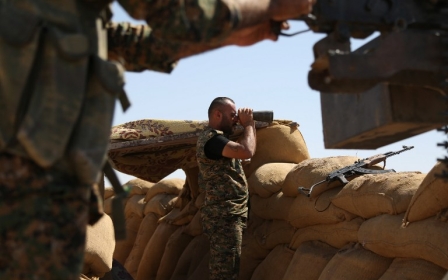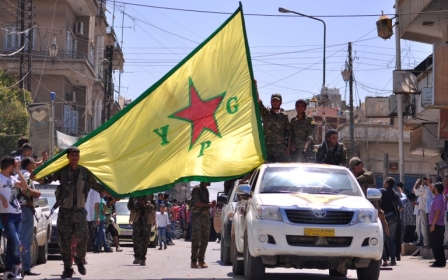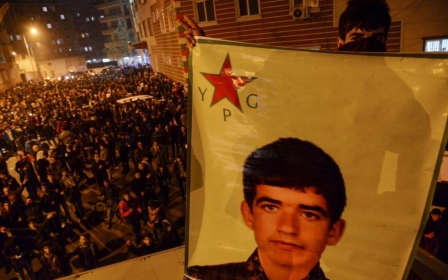Dangers lurk on the road to Kobane

KOBANE, Syria - Even as Islamic State forces consolidate their grip on Palmyra and move west towards the cities of Syria’s heartland, their last strongholds in the north may be coming under threat. At least that is the boast of senior officials in the Syrian Kurdish movement that has taken control of a 450 kilometre stretch of the border with Turkey as well as several key towns within it. They call the region Rojava.
The Syrian Kurdish YPG, or People’s Protection Units, have been the main force in Syria’s northeast since President Bashar al-Assad withdrew his troops in July 2012. Following secular principles with no Islamist political ideology, they have repeatedly clashed with Sunni Arab groups, including Jabhat al-Nusra and IS.
In 2013, rebel forces seized the town of Tal Abyad, half of whose population are Sunni Arabs. Last September IS attempted to capture Kobane and were only driven out in January after four months of determined YPG resistance and hundreds of US airstrikes. In June, the YPG - again with the help of US bombing - regained control of Tal Abyad after almost two years of IS occupation.
Now the YPG’s sights are on Jarabulus, a town on the west bank of the Euphrates about thirty miles from Kobane. “We have plans for liberating Jarabulus. It could fall next week, next month, even tomorrow," Idriss Nassan, the Kobani canton’s deputy minister for foreign relations told Middle East Eye.
"It’s the last IS-controlled border crossing with Turkey," he added while saying that he based his optimism on comments from senior military officials. “Sipan Hamo, the YPG commander, said two weeks ago ‘We’re going to liberate Jarabulus’,” Nassan said.
Since the US started bombing IS targets in Syria a year ago, YPG forces have been their main allies on the ground. YPG troops say they use electronic tablets to give the map coordinates of IS positions to US target acquisition teams in the region. An attack on Jarabulus would require US help. Asked if the US had approved the mission, Nassan replied “When he [Sipan Hamo] says this, he’s coordinated with the US because we’re part of the international coalition. They fight in coordination with us”.
Taking the Jarabulus crossing would be a major advance for the YPG since they are convinced that IS gets supplies of recruits and weaponry through Turkey. YPG officials claim the crossing is open, and IS has no need for smugglers or breaks in the border fence.
Seizing Jarabulus is not aimed just at IS but also at frustrating Turkey’s plans for creating a “safe zone” between Jarabulus and Azaz which it announced in July. Turkey has not been clear about its intentions and has so far taken no military action to implement the plan. However, Kurdish forces are concerned and Nassan believes that the “Turkey says the safe zone will be forbidden for the YPG and IS to enter".
"They say the YPG are terrorists like IS,” he added.
YPG officials are convinced Turkey’s main goal is to stop the Kurds from linking Rojava to the east with the Kurdish enclave of Afrin in Syria’s far west. If successful, the Kurds would then control the entire Syrian border with Turkey, raising Turkish anxiety that an independent Kurdish state would emerge. The US has not approved the Turkish plan for a safe zone.
Whether the YPG’s confidence on capturing Jarabulus is justified remains to be seen, especially as IS has destroyed the main bridge on the Euphrates which connects Kobane with Jarabulus.
Violence on the road to Kobane
There are other signs that security in Rojava is fragile. On the road from Kobane, to the government guesthouse in Amuda where I am staying, we came across four incidents. The road was dotted with checkpoints where soldiers check vehicles and documents. But in Qayyil, an almost entirely deserted Arab village, 48 kilometres east of Kobane, several dozen extra YPG troops were visible, fanning into side streets and standing on guard along the road. Three vehicles with mounted machine guns had taken up positions at the junction of the road to Raqqa, the IS capital in Syria, 96 kilometres away. An officer said they were responding to reports that four IS fighters had entered the village.
Some 15 kilometres further east in the border town of Tal Abyad, which various groups occupied for two years until June this year, first under Jabhat al-Nusra, then Islamic State, a woman called out to the police car which was escorting us. Speaking Kurdish, she said a bearded man in black clothes associated with IS, had jumped over a wall into the yard of her home and then made off across another wall when he saw her. The police promptly called for help and four soldiers entered the yard. Local officials give repeated warnings that IS may have left sleeper cells of sympathisers and fighters in areas from which they have been forced to retreat, particularly in Arab villages or towns with a mixed Kurdish and Arab population. Whether true or not, the notion keeps people nervous.Worse was to come at Ras al-Ayn, a border town which Kurds call Serekaniye, almost 100 kilometres further east. At the eastern edge of the town we heard an explosion and saw a cloud of smoke and dust rising just less than a kilometre ahead of us. An IS member had blown himself and his vehicle up at a checkpoint, killing three soldiers and two civilians. At almost the same moment, a man on a motorbike blew himself up at another checkpoint on the western edge of the town, but no one else died.
YPG officials said IS had put out a statement saying they would take action during Eid which starts in a few days’ time.
The four incidents were a clear sign that IS is still able to create tension even in areas where it has lost control and no longer has an acknowledged presence. The incidents may also be designed to keep the YPG fully stretched along a long east-west front and less able to concentrate its forces, in other words, a warning that the attack on Jarabulus may have to wait.
New MEE newsletter: Jerusalem Dispatch
Sign up to get the latest insights and analysis on Israel-Palestine, alongside Turkey Unpacked and other MEE newsletters
Middle East Eye delivers independent and unrivalled coverage and analysis of the Middle East, North Africa and beyond. To learn more about republishing this content and the associated fees, please fill out this form. More about MEE can be found here.





